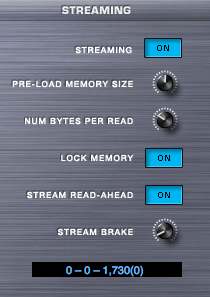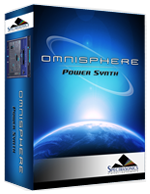SYSTEM - Streaming

The
first column contains controls for the streaming function in Omnisphere.
Streaming permits samples to largely reside on disk. In this way you can use
large samples with a relatively small amount of memory.
Streaming Swtich

This button engages or disengages drive streaming in Omnisphere. If you disable disc streaming your sounds will take longer to load and will take up more RAM.
It’s recommended to leave streaming ON unless you know what you are doing (e.g. have lots of physical memory) or need to disable hard drive streaming.
NOTE: On the Mac version of Omnisphere, the Streaming Switch is replaced by a Mode menu, which adds a Sample File Server as an alternative to using 64-bit hosts.
Pre-Load Memory Size

Determines how much memory is devoted to sample pre-load. The higher the settings, the less likely that glitches will occur due to streaming problems. However, turning it up requires more memory and will increase the load time for Soundsources.
Recommended values are between 22,000 to 66,000, with 60,000 as the standard default value. If patches make use Timbre or Sample-Start, this parameter might need to be raised over 40,000.
NOTE - Soundsources must be reloaded when changing this parameter before the new value will take effect.
Range - 1000 samples to 100,000 samples
Num Bytes Per Read

Determines the size of each read of sample data. Increasing this setting improves performance when working with a small number of large samples. The recommended setting is around 150,000. This parameter is generally not as important as the Pre-Load Memory Size. Values smaller than 100,000 should be avoided.
Range - 1000 Bytes to 480,000 Bytes
Lock Memory

Determines if RAM is dedicated to holding the Pre-Load memory. Lock Memory should be kept on except for rare cases where RAM is unavailable for this purpose (such as running many large applications simultaneously.) Soundsources must be reloaded when changing this parameter before it will take effect.
Stream Read-Ahead

This switch increases low-level disc read-ahead so fewer physical disc head movements are needed to perform several consecutive read actions. Since Stream Read-Ahead improves efficiency in almost all situations it should be left on.
Stream Brake

The control balances system resources between streaming and other operations. This is the second most important streaming parameter, after the Pre-Load Memory Size. It should generally be set to a moderate value around 0.1. Values above 0.5 may lead to streaming glitches due to deferring streaming reads in order to give priority to other processing operations in the application. Turning it down to zero may cause glitches in other operations due to the streaming monopolizing the CPU. There is a relationship between this parameter and the Num Bytes Per Read parameter. When that parameter is turned up, this parameter should generally also be turned up.
Range - 0.00 seconds to 1.00 seconds
Stream Display

Left number - The number of streams in progress. Should normally be zero, but should flash temporarily to a non-zero number when a note is started. If it stays non-zero for several seconds, that may be a problem, and so reducing the Brake (or increasing the PreLoad) would be recommended.
Middle number - The number of notes in progress. Should be zero when no notes are playing. May be a 2x or 4x multiple of the number of notes when doing velocity cross fading, or when there are multiple layers.
Right number - The number of samples that are "pre loaded" (including all voices in all parts). Should go up and down as various SoundSources are loaded. It may "lag" a bit behind load actions, which is normal.
Right number in parenthesis - number of samples loaded in "Streaming = OFF " mode. Should always be zero unless Streaming is turned off. An error is indicated by the streaming status display at the bottom of the left column on the system page when you see two numbers at the end of the display;



